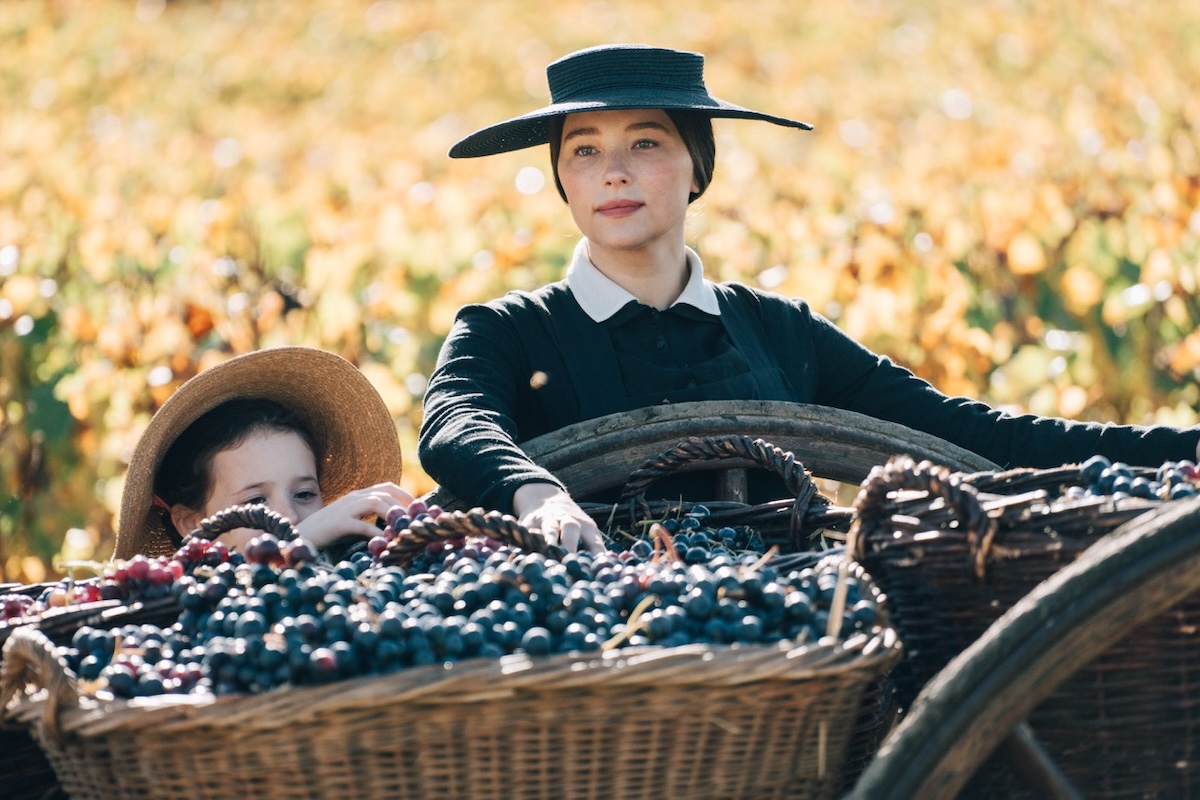Champagne’s Turn on the Big Screen
'Widow Clicquot' Tells True, Tragic, and Triumphant Tale of How One Woman Changed French Wine

'Widow Clicquot' Tells True, Tragic, and Triumphant Tale of How One Woman Changed French Wine

While wine and film individually enjoy modern reputations as glorious pursuits that combine skilled craft with artistic vision, the pairing of the two disciplines tends to result in cinematic catastrophe. “Wine movies” are typically riddled with winemaking wrongs that cause anyone with any oenological understanding to cringe, and they usually rely on wine mostly as setting and lifestyle, rather than central role. (The most notable exception, of course, would be our own region’s starring showcase in Sideways.)
Thankfully, the recently released Widow Clicquot does not fall victim to such disaster, proving to be a serious, emotive, and pensive film about tragedy, terrible sexism, and ultimately triumph, with sparkling wine and famous vineyards simmering steadily in the background. It’s also a very true story, based on Tilar J. Mazzeo’s 2008 book The Widow Clicquot: The Story of a Champagne Empire and the Woman Who Ruled It.
The book and the film, which focuses on the early chapters in this saga, reveals how a French woman named Barbe-Nicole Clicquot Ponsardin fought against the Napoleonic era’s patriarchal ways to retain the estate of her late husband, who died (possibly from suicide or an overdose, or both) seven years after their wedding. While fighting to keep her property and business, the “widow Clicquot” made innovations that changed Champagne production forever, specifically by developing the first sparkling rosé and inventing the process of riddling, which made for cleaner wines.
The brand she created in 1810, Veuve Clicquot (“veuve” being “widow” in French), became a major player in the Champagne region, helping to elevate the drink from a regional delicacy into the global celebration beverage that we know it as today. Veuve’s yellow label is now ubiquitous, and it remains one of the largest Champagne producers on the planet.
I was able to ask the film’s producer Christina Weiss Lurie a few questions about the film, which is now screening at the Hitchcock Cinema in Santa Barbara. (They serve alcohol there, including sparkling wine, though I doubt it’s Veuve!)

How did this film come about?
I read the book 14 years ago and instantly pictured it as a film. It had many different iterations prior to this one.
Was it hard to balance being accurate about winemaking and grape growing without getting too technical for the general audience?
Yes, quite frankly. Making a feature film versus a limited series also impacted the creative choices. A series would have allowed a different version of the story with more historical facts and far more characters.
Is there more of an appetite for movies about winemaking and the wine industry in the general film-going audience these days?
I am not sure. I know it is a story that I fell in love and wanted to tell.
I see that the film was shot in France. Were French winemakers supportive of the project?
They can be at times protective of their own stories. They were very supportive. We didn’t run into any issues throughout the production.

Was there a temptation at all to fast forward to the end of her story, which is more triumphant? How did you select this phase of her life to focus on?
Once we understood we would need to pick a specific moment in order to make this film, we decided on the origin story beginning when Barbe-Nicole became a young widow highlighting her grit, determination, and the challenges that ultimately led to her triumph.
What messages do you hope resonate the most with filmgoers?
Widow Clicquot’s journey was to craft the finest champagne, with consistency and style. Her techniques ended up revolutionizing the industry. She did so by being resourceful, audacious, and hard-working. She had an unwavering dedication and refused to give up.
It’s this badass attitude at a time when women were to be seen raising their families and acting as homemakers that still feels so timely today. These universal themes should hopefully resonate with young women today and allow them to dream big.
Fri, Jan 03 6:00 PM
Santa Barbara
Fri, Jan 03 7:00 PM
Santa Barbara
Fri, Jan 03 9:00 PM
Santa Barbara
Sat, Jan 04 11:30 AM
Santa Barbara
Sat, Jan 04 8:00 PM
Santa Barbara
Sun, Jan 05 6:00 PM
Santa Barbara
Sun, Jan 05 7:00 PM
Santa Barbara
Sun, Jan 05 7:00 PM
Santa Barbara
Mon, Jan 06 7:30 PM
Santa Barbara
Wed, Jan 08 7:30 PM
Santa Barbara
Please note this login is to submit events or press releases. Use this page here to login for your Independent subscription
Not a member? Sign up here.
You must be logged in to post a comment.